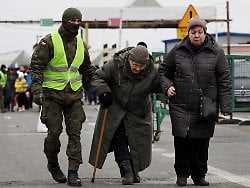The day of the war at a glance
Humanitarian ceasefire failed – Israel begins mediation
03/05/2022 10:21 p.m
The fighting in Ukraine continues with great severity and many victims. Both warring parties accuse each other of having prevented the agreed evacuation of two embattled cities. Surprisingly, Israel’s Prime Minister Bennett traveled first to Moscow and then to Berlin for a mediation mission. More than a million Ukrainians have now left their country. Tens of thousands of them fled to Germany.
Battle for Mariupol continues
The attempt to evacuate civilians from the embattled Ukrainian cities of Mariupol and Volnovakha via humanitarian corridors has largely failed. Russia officially announced in the afternoon that it had resumed its attacks on the two surrounded cities. “Since the Ukrainian side is not ready to influence the nationalists or to extend the ceasefire, offensive actions resumed at 6 p.m. Moscow time (4 p.m. Central European Time),” said a spokesman for the Russian Defense Ministry.
The Ukrainian authorities had previously suspended the evacuation of the two neighboring cities planned for today. Both sides accused each other of not complying with the ceasefire agreed the day before. Ukrainian President Volodymyr Zelenskyy called for further defense of Mariupol. “Anyone who needs help should be given the opportunity to come out,” the president said. “All who can defend their city must continue the fight.” There are probably several hundred thousand civilians in the city of Mariupol.
According to the Ukrainian account, Russia continued its offensive in other war zones. Advancing on Kyiv, Russian troops continued to meet heavy resistance in western suburbs and the northern city of Chernihiv. Artillery and rocket fire killed dozens of civilians in Chernihiv. “There were dead bodies all over the ground,” a local resident told AFP. The city is badly damaged.
The Russian military reported the capture of several small towns and a military base near the southern Ukrainian regional capital of Cherson. In total, more than 2,000 objects of military infrastructure and more than 700 tanks of Ukraine have been destroyed so far, said Russian military spokesman Igor Konashenkov.
Putin threatens the West
According to President Vladimir Putin, the Russian army has already achieved some of the military objectives in Ukraine. For example, the “destruction of the military infrastructure” in Ukraine “as part of the operation (…) is practically complete,” as quoted by Russian agencies. He mentioned weapons and ammunition depots.
Putin warned the West against enforcing a no-fly zone over Ukraine. “We consider any movement in this direction as a country’s participation in an armed conflict,” Putin said. NATO had already rejected a corresponding request from Ukraine. Putin repeated conditions for an end to the war against Ukraine, most notably the country’s demilitarization. “Our proposals are on the table with a group of Kyiv negotiators. We hope they will respond positively,” he said. “We need to know clearly what weapons are where and what controls they are under.” According to unanimous information, the two warring parties agreed to continue their direct talks on Monday.
Israel’s prime minister on mediation mission
In the evening it became known that Israeli Prime Minister Bennett had traveled to Russia as a mediator. Bennett met with Putin for talks, a spokesman for the Israeli leader confirmed. The Israeli spokesman did not provide any information about the content of the three-hour conversation between Bennett and Putin. Kremlin spokesman Dmitry Peskov said, according to Russian news agencies, that Putin and Bennett discussed the “situation in Ukraine.”
After the meeting, Bennett informed the Ukrainian President Volodymyr Zelenskyy and before the talks with Putin “coordinated with the USA, Germany and France,” according to the Israeli prime minister’s office. From Moscow he traveled to Berlin to meet Federal Chancellor Olaf Scholz.
More than 1.3 million Ukrainians fled
The federal police have so far registered 27,491 war refugees from Ukraine in Germany, according to a spokesman for the Federal Ministry of the Interior. At the same time, he pointed out that the actual number of war refugees from Ukraine who entered Germany could be significantly higher, since the data from the Federal Police would only show a part of the refugees, also due to the non-existent border controls. According to estimates by the UN refugee agency UNHCR, more than 1.36 million people had fled Ukraine by Saturday, most of them to Poland.
In many German cities, people took to the streets again to demonstrate against the war and for peace in Ukraine. Tens of thousands of people also demonstrated in Rome. The Russian embassy in Berlin has meanwhile complained about “discrimination” against Russians in Germany. The embassy said it had received hundreds of complaints from compatriots in Germany in the past three days alone about threats and hate mail.
More reports, analyzes and interviews Ukraine war:
You can read all the other developments of the day in our live ticker on the Ukraine war.
